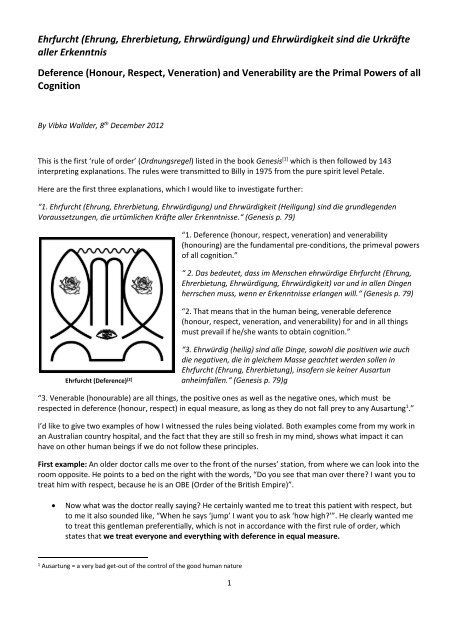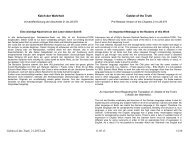View and Download PDF
View and Download PDF
View and Download PDF
Create successful ePaper yourself
Turn your PDF publications into a flip-book with our unique Google optimized e-Paper software.
Ehrfurcht (Ehrung, Ehrerbietung, Ehrwürdigung) und Ehrwürdigkeit sind die Urkräfte<br />
aller Erkenntnis<br />
Deference (Honour, Respect, Veneration) <strong>and</strong> Venerability are the Primal Powers of all<br />
Cognition<br />
By Vibka Wallder, 8 th December 2012<br />
This is the first rule of order (Ordnungsregel) listed in the book Genesis [1] which is then followed by 143<br />
interpreting explanations. The rules were transmitted to Billy in 1975 from the pure spirit level Petale.<br />
Here are the first three explanations, which I would like to investigate further:<br />
1. Ehrfurcht (Ehrung, Ehrerbietung, Ehrwürdigung) und Ehrwürdigkeit (Heiligung) sind die grundlegenden<br />
Voraussetzungen, die urtümlichen Kräfte aller Erkenntnisse. (Genesis p. 79)<br />
1. Deference (honour, respect, veneration) <strong>and</strong> venerability<br />
(honouring) are the fundamental pre-conditions, the primeval powers<br />
of all cognition.<br />
2. Das bedeutet, dass im Menschen ehrwürdige Ehrfurcht (Ehrung,<br />
Ehrerbietung, Ehrwürdigung, Ehrwürdigkeit) vor und in allen Dingen<br />
herrschen muss, wenn er Erkenntnisse erlangen will. (Genesis p. 79)<br />
2. That means that in the human being, venerable deference<br />
(honour, respect, veneration, <strong>and</strong> venerability) for <strong>and</strong> in all things<br />
must prevail if he/she wants to obtain cognition.<br />
3. Ehrwürdig (heilig) sind alle Dinge, sowohl die positiven wie auch<br />
die negativen, die in gleichem Masse geachtet werden sollen in<br />
Ehrfurcht (Ehrung, Ehrerbietung), insofern sie keiner Ausartun<br />
Ehrfurcht (Deference) [2] aheifalle. (Genesis p. 79)g<br />
3. Venerable (honourable) are all things, the positive ones as well as the negative ones, which must be<br />
respected in deference (honour, respect) in equal measure, as long as they do not fall prey to any Ausartung 1 .<br />
Id like to gie two examples of how I witnessed the rules being violated. Both examples come from my work in<br />
an Australian country hospital, <strong>and</strong> the fact that they are still so fresh in my mind, shows what impact it can<br />
have on other human beings if we do not follow these principles.<br />
First example: An older dotor alls e oer to the frot of the urses statio, fro here e a look ito the<br />
roo opposite. He poits to a ed o the right ith the ords, Do ou see that a oer there? I at you to<br />
treat him with respect, because he is an OBE (Order of the British Empire).<br />
<br />
Now what was the doctor really saying? He certainly wanted me to treat this patient with respect, but<br />
to me it also sounded like, Whe he sas jup I at ou to ask ho high?. He learl ated e<br />
to treat this gentleman preferentially, which is not in accordance with the first rule of order, which<br />
states that we treat everyone <strong>and</strong> everything with deference in equal measure.<br />
1<br />
Ausartung = a very bad get-out of the control of the good human nature<br />
1
The irony with this doctor is that he would always refer to e as the Hu or Wog, util - after ignoring<br />
it for a while - I stood up to him <strong>and</strong> told him that I did not like to be treated like that. From then on he<br />
treated me like every other nurse.<br />
I respoded to the dotor puttig hads o hips ad saig, I treat all patiets ith respet,<br />
thak ou er uh, tured o heels ad et ak to ork.<br />
The second example: One day during h<strong>and</strong>over the nurses were talking about a young female indigenous<br />
person. She was about 16 years old <strong>and</strong> had her tonsils removed two days earlier. The nurse h<strong>and</strong>ing over<br />
finished her report with a snide tone of voice, …ad she hast had a shoer et! As it happened, I was<br />
assigned to the room, so I went into the room, greeted my patients, checked all their charts in order to prioritise<br />
my workload, <strong>and</strong> then I asked the young girl, who was still on intravenous fluids, Would ou like e to assist<br />
you with a shower? With big round eyes <strong>and</strong> a surprised look on her face she asked, Ca I have a shower? So<br />
it appeared to me that this poor girl did not know that she could have a shower whilst on a drip, <strong>and</strong> it seemed<br />
that my colleagues had not bothered offering her the appropriate assistance. Could it be that they had some<br />
prejudice towards indigenous people <strong>and</strong> that they had neglected her <strong>and</strong> failed in their duty of care?<br />
So lets go back to the first two explanations:<br />
Deference (honour, respect, veneration) <strong>and</strong> venerability (honouring) are the fundamental pre-conditions, the<br />
primeval powers of all cognition, <strong>and</strong> that means that it must prevail in us if we want to obtain cognition.<br />
So how do we develop …deference for ad i all thigs <strong>and</strong> make it prevail?<br />
<br />
<br />
<br />
<br />
<br />
By treating all human beings with the same respect, regardless of their social status, achievements in<br />
life, skin colour, age, <strong>and</strong> so forth. In other words, we do not grovel, but we do not neglect them either,<br />
rather we give each one of them the same attention, respect, assistance <strong>and</strong> so forth that we would<br />
expect for ourselves.<br />
By caring for <strong>and</strong> respecting every living creature on this planet <strong>and</strong> not harming them unnecessarily. So<br />
when we kill animals for our consumption, we do it in the most humane manner; but ultimately we<br />
strive for growing the meat in factories. And when we need to kill vermin to protect our health or food,<br />
we should also do it with minimal suffering for the creature.<br />
By protecting the environment: If we treat our environment carelessly by wasting precious resources,<br />
then we do not show the appropriate venerable deference to a planet, which was created over a period<br />
of millions of years for the benefit of evolution. And we do not show respect to the next generations,<br />
who may struggle to live with dignity, because of the wastefulness of preceding generations. We need<br />
to learn to appreciate nature as much as man-made things, <strong>and</strong> we must do everything in our power to<br />
protect it all ad tr ot to otriute to this thro-aa soiet.<br />
By being punctual for meetings <strong>and</strong> appointments. If we are not punctual, we are not showing<br />
deference/respect towards the other person/s, who has/have been made to wait.<br />
By expressing our deference/respect for human beings in our speech.<br />
In contact report 169 [3] Billy <strong>and</strong> Quetzal discuss that talking is supposed to be a means for<br />
communication <strong>and</strong> should really only be used for that purpose, <strong>and</strong> that all communication should be<br />
of a harmonious nature. In this context Billy <strong>and</strong> Quetzal refer to sl<strong>and</strong>er <strong>and</strong> back biting in particular,<br />
which many human beings engage in, <strong>and</strong> which hinders them in their own evolution, because of the<br />
negative effects on their consciousness. But using strong language like swear words or calling other<br />
persons names could not be considered harmonious either, because they always hurt someone, <strong>and</strong> I<br />
think that using them shows a lack of deference, honour, respect <strong>and</strong> veneration. Just think about how<br />
easily <strong>and</strong> readily people use the f-word these days. It has become very common, <strong>and</strong> many of my<br />
fellow human beings seem to think that it is cool to use it, <strong>and</strong> that I am old-fashioed eause I dot.<br />
But to me using the f-word or other strong language is a sign of the decline of our society, how our<br />
2
communication <strong>and</strong> respect for each other is diminishing, <strong>and</strong> how little control we have over our<br />
emotions when we use swear words like that.<br />
Freedom <strong>and</strong> peace on this planet can only be obtained with deference, honour, respect <strong>and</strong> veneration. Many<br />
of us may think that we are already doing our bit towards freedom <strong>and</strong> peace on this planet <strong>and</strong> that we are not<br />
the ones causing all the trouble, because we are not fighting with our neighbours <strong>and</strong> we are peace loving in<br />
general. Its usually the others that are upsetting the apple cart. However, if every night we honestly reflect back<br />
on our day <strong>and</strong> think about our thoughts, words <strong>and</strong> actions, we will probably find that we have strayed off the<br />
path somewhere along the line <strong>and</strong> that there is room for improvement, because every thought of envy,<br />
jealousy, dislike, hatred <strong>and</strong> so forth can subconsciously lead to a negative word or action, which in turn then<br />
breaches this first rule of order.<br />
Contributing to freedom <strong>and</strong> peace means that we consider <strong>and</strong> respect others right to decide, their wishes,<br />
their needs <strong>and</strong> personalities <strong>and</strong> that we do not try to curtail their way of life; that we do not try to push our<br />
opinion on them in the slightest manner. It means that we accept others as they are, with their peculiarities,<br />
ideas, wishes, needs <strong>and</strong> so forth, <strong>and</strong> that we do not try to change them, or judge them in any way.<br />
The only person one can change for the better is oneself, <strong>and</strong> if we develop more deference, honour, respect<br />
<strong>and</strong> veneration within us we will gain cognition <strong>and</strong> contribute to peace in this world.<br />
Nur durh das Ershaffe o Erketisse erag sih der Mesh<br />
Wisse ud Weisheit soie ahre Liee aufzuaue. [4]<br />
Only through the creation of cognition is the human being able to<br />
uild up koledge ad isdo as ell as true loe, hih are<br />
fundamental to our evolution.<br />
The abilities <strong>and</strong> powers for it rest idle in our consciousness <strong>and</strong> we<br />
can experience everything <strong>and</strong> obtain cognition, knowledge, wisdom<br />
<strong>and</strong> love if we develop certain powers within us through studying the<br />
spiritual teaching, thinking about it, working through it, applying it to<br />
our daily life <strong>and</strong> thus developing the powers of underst<strong>and</strong>ing <strong>and</strong><br />
ability.<br />
Erkenntnis (cognition)<br />
Petale further states in the iterpretig eplaatios that the door to cognition opens according to a distinct<br />
rule of order (Ordnungs-Regel); <strong>and</strong> below I have summarised a few points from the explanations:<br />
<br />
<br />
<br />
<br />
It begins with developing a favourable fundamental mood of our consciousness <strong>and</strong> psyche, <strong>and</strong> the<br />
basic factor for it is deference <strong>and</strong> control. Deference here is not meant in the sense of putting someone<br />
or something on a pedestal <strong>and</strong> which leads to submissiveness, but rather seeing others as equals with<br />
equal values.<br />
By the same token, criticism must only be applied in equalisedness so that it does not turn into judging<br />
others <strong>and</strong> thus to a damaging factor.<br />
Therefore we need to continuously work hard <strong>and</strong> energetically on ourselves, study the spiritual<br />
teaching <strong>and</strong> experience it through our own thinking <strong>and</strong> action.<br />
We may seek a teacher, who can explain the teaching to us, but the real work happens within ourselves.<br />
Through self-education we must tune ourselves into deference <strong>and</strong> so forth <strong>and</strong> must search for it in our<br />
environment, in other human beings, in animals <strong>and</strong> plants <strong>and</strong> approach each <strong>and</strong> everyone in<br />
equalisedness.<br />
3
We must not see only the good or only the bad, but rather see both equally for what they are, namely<br />
factors of life that are necessary for evolution.<br />
Therefore, we must never be judgemental, rather be discerning <strong>and</strong> respecting <strong>and</strong> make this our<br />
internal <strong>and</strong> external rule of life.<br />
This rule of order must be a part of our consciousness, as well as our thoughts <strong>and</strong> feeling <strong>and</strong> our<br />
psyche <strong>and</strong> we should endeavour to keep it in our fine-spiritual perception, feelings <strong>and</strong> thoughts,<br />
whether we are awake or asleep, whether we are alone or in company.<br />
This is our starting point if we want to enter the mysteries of the spiritual teaching <strong>and</strong> gain higher<br />
knowledge <strong>and</strong> useful cognitive skills <strong>and</strong> powers.<br />
We must constantly endeavour to find <strong>and</strong> create deference (honour, respect, veneration) <strong>and</strong><br />
venerability (honouring), so that they become a constant feature in our consciousness <strong>and</strong> replace<br />
thoughts <strong>and</strong> feelings of non-deference, disrespect, <strong>and</strong> so on, as well as snide criticism <strong>and</strong> erroneous<br />
appraising of others.<br />
Completely silent <strong>and</strong> unnoticeable to the outside world, a change will occur within us when we walk<br />
the path of cognition <strong>and</strong> develop deference. Ol the koig oes, ho speak the laguage of the<br />
spiritual teaching, will notice the change in us.<br />
We will continue with our work <strong>and</strong> obligations as usual, because the change happens internally,<br />
invisible <strong>and</strong> unrecognisable to the uninitiated ones.<br />
But in us the sprouting deference (honour, respect, veneration) <strong>and</strong> venerability (honouring) illuminates<br />
the life of the consciousness <strong>and</strong> the psyche.<br />
And in the sprouting general mood, our entire consciousness-life <strong>and</strong> psyche-life suddenly finds a<br />
beaming <strong>and</strong> warming epicentre, which rises like the sun, which by means of its rays, frees everything<br />
that lies dormant in the darkness <strong>and</strong> awakens it to life by means of its warmth.<br />
It ot e easy in the beginning to realise that deference (honour, respect, veneration) <strong>and</strong> venerability<br />
(honouring) are the basic factors of all cognition, because we are still caught up in some belief, <strong>and</strong><br />
through our belief assume that cognition is merely a skill in itself <strong>and</strong> a pure thought process.<br />
But its not; ogitio is ahieed through deferee, hoour, respet…<br />
However, all cognition has its origin in our consciousness <strong>and</strong> thoughts as well as our feelings.<br />
Therefore we need to learn to control our feelings, thoughts <strong>and</strong> fine-spiritual perception <strong>and</strong> steer<br />
them with the appropriate strength according to need.<br />
We must also learn to create them consciously <strong>and</strong> to work with them.<br />
References:<br />
1. Meier, BEA 1975/2011, GENESIS (Schöpfungs-Genesis), 2. Auflage, Wassermannzeit-Verlag, CH-8495 Schmidrüti,<br />
Schweiz [available in German only] (page 79).<br />
2. Meier, BEA 2004, Symbole der Geisteslehre, Wassermannzeit-Verlag, CH-8495 Schmidrüti, Schweiz [available in<br />
German only].<br />
3. Meier, BEA 2004, Plejadisch-plejarische Kontaktberichte Block 4, Wassermannzeit-Verlag, CH-8495 Schmidrüti,<br />
Schweiz [available in German only] (page 415)<br />
4. Meier, BEA 2012, Lehrschrift für die Lehre der Wahrheit, Lehre des Geistes, Lehre des Lebens, Wassermannzeit-<br />
Verlag, CH-8495 Schmidrüti, Schweiz [available in German only] (page 11)<br />
4




